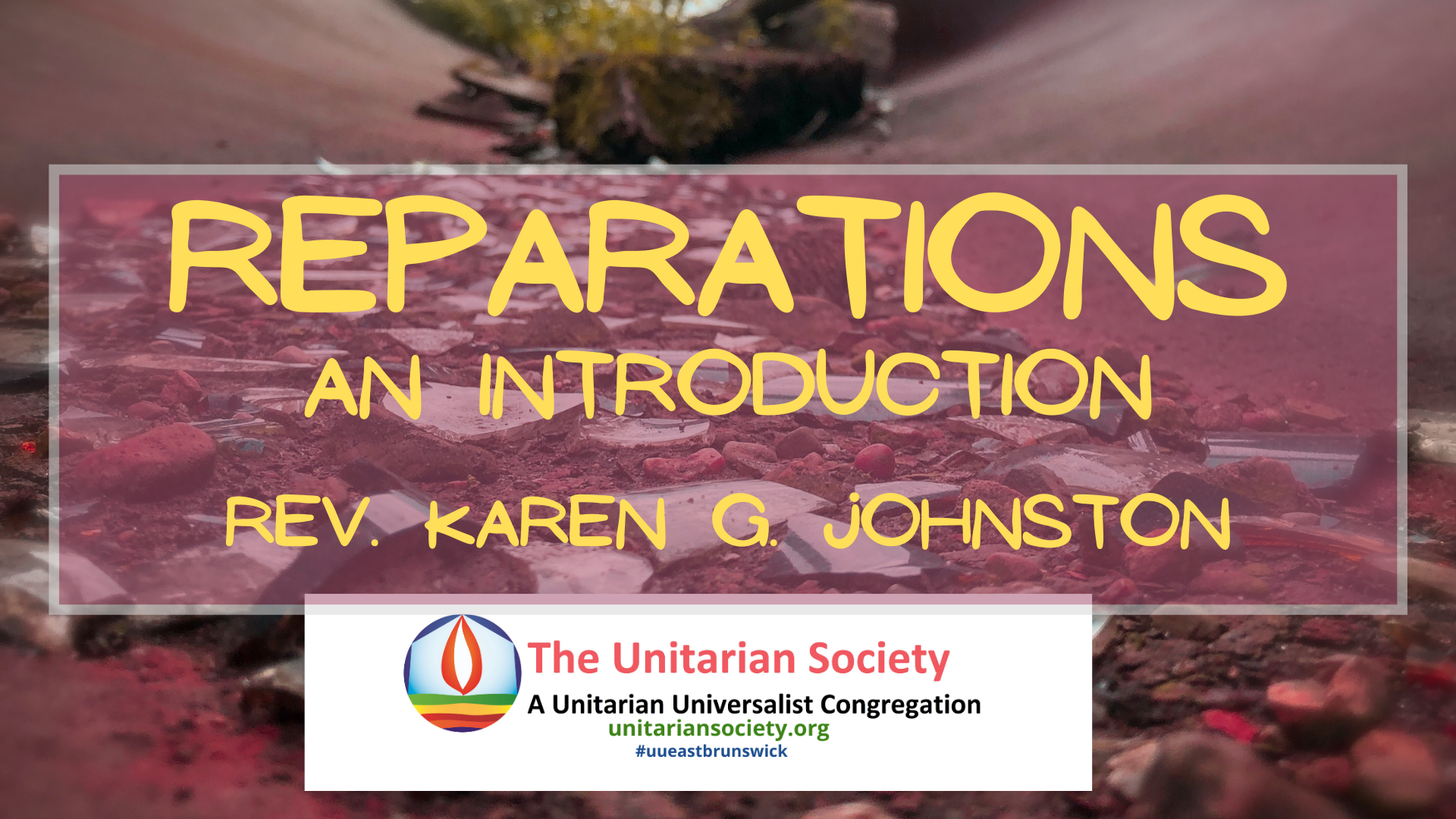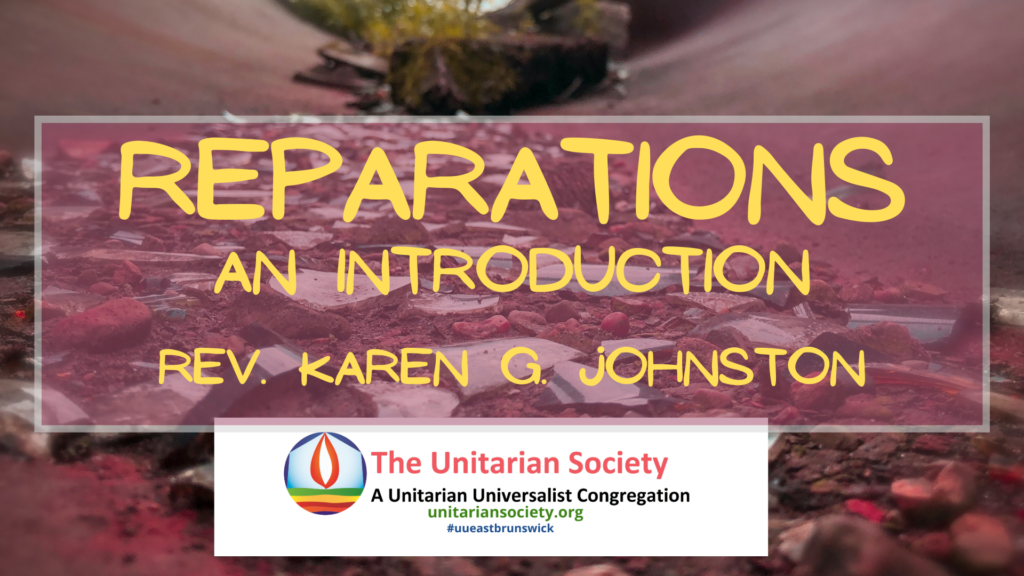
Introduction
The opening skit for Saturday Night Live back on April 11, was a morning news show in Minneapolis with four anchors, two Black and two white. This was days before the Derek Chauvin verdict for murdering George Floyd. Banter reveals the white anchors have more confidence in the judicial system than the Black anchors. The white anchors are insistent on finding common ground, which their Black counterparts are willing to be a part of as far as that goes.
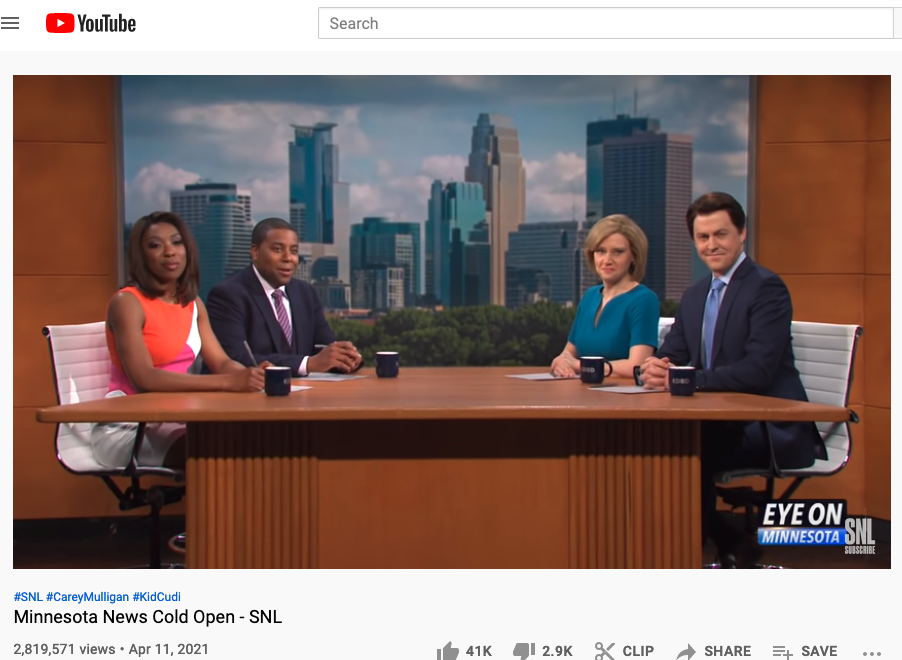
One Black anchors says “there’s a glaring discrepancy in the way that Black people are treated by police,” both white anchors, with relief in their voices, confirm their agreement.
The other Black anchor says, “and we need concrete solutions to fix the problem,” to which the white anchors, momentum picking up, nearly shout, “no argument there!”
Then first Black anchor offers, “And we start with reparations.”

To which the white anchor says, incredulously,
“Now wait just a minute!”
The Black anchors are not surprised – it was clearly a set up. They laugh at their pseudo-attempt to get their white co-workers to follow the logic of their own words, knowing that at the point of consideration of reparations, common ground would disappear yet again.
Reparation means “the making of amends for a wrong one has done, by paying money to or otherwise helping those who have been wronged.” When when it comes to cultural reparations, the concept raises some intense reactions. Dismissal. Incredulity. Rage. Fragility. Scorn. Denigration disguised as hyper-rationality. Condescension. Whitesplaining.
And more and more lately: Possibility.
There was a time when talk about reparations was on the fringe. Even in fringe times, it was a legitimate conversation, but was relegated to the margins. No more. Wider American society is engaging this concept more and more and so is Unitarian Universalism. We’re going to spend some holy time this morning exploring what is calling on us to engage our best moral imagination, one of the ways we ask ourselves, “Where do we come from? Where are we going?”
Part I: History
In 1783, before the birth of this nation’s constitution, freedwoman Belinda Royall petitioned the commonwealth of Massachusetts for reparations. She had been Kidnapped as a child from what is now Ghana, then sold into slavery, she survived fifty years of enslavement, then sought a pension from the family that enslaved her.
Hers was one of the earliest successful attempts at reparations (in part because the family that enslaved her were British loyalists) in this nation. As Ta-Nehisi Coates concludes after sharing this story (and I’m paraphrasing here): the idea that Black people might be owed something after 150 years of enslavement might not have been national consensus, but at least it was not outrageous. Reparations is not a modern idea.
Not a modern idea and not a theory from the elites, as we well see from Jordan Anderson’s response to the offensive request from the man who had previously enslaved him to return to work for him. What a response from Jordan Anderson: full of truth-telling, demands for accountability, and not a small amount of satire!
Reparations in this nation does not revolve solely around race-based chattel slavery. Sometimes talk of reparation relates to harm that is not slavery, but is still race-based. Think of this weekend’s marking of the 100th year since the Tulsa massacre, when the most affluent and productive Black neighborhood in this nation was bombed, 300 Black people were murdered and thousands left homeless. The three remaining survivors of that massacre recently testified in Congress. One of them, 107-year-old Viola Fletcher said this:
“I will never forget the violence of the white mob when we left our home. I still see Black men being shot, Black bodies lying in the street. I still smell smoke and see fire. I still see Black businesses being burned. I still hear airplanes flying overhead. I hear the screams. I have lived through the massacre every day. Our country may forget this history, but I cannot….I am 107 years old and I have never … seen justice. I pray that one day I will.”
We can think reparations in the U.S. context for other cultural arenas – for instance, reparations for the displacement and genocide of Native peoples of this land. Not just payment, but return of lands stolen from them. Or to those Japanese Americans who were imprisoned in camps during World War II.
It’s a bigger issue than a single sermon can do justice to, so I make my humble, circumscribed attempt, sticking to reparations as it applies to the legacy of forcibly bringing Africans to this nation as chattel slaves and the ever-renewing ways in which white supremacy embeds itself in our institutions.
Part II: Practicality
One way to bring the conversation about reparations to a standstill is to acknowledge how many groups could be legitimately considered due some form of reparations – displaced Native peoples; descendants of those stolen from Africa; Japanese-American interred during World War II; our Mexican-American siblings in the Southwest living on the land of their ancestors which was claimed by the USA as war winnings. The argument goes: if it’s not feasible for all, it’s not fair for one.
Yet, the U.S. provided reparations for the Japanese American internment – signed into law by President Reagan in 1988. Ultimately paid, it paid out $1.6 billion to just over 82,000 Japanese Americans.
Another way to undermine reparations is talk of how impossible it is to go all the way back to slavery. I find Ta-nehisi Coates response compelling. In his 2014 article, “The Radical Practicality of Reparations”, he wrote,
Even if one feels that slavery was too far into the deep past (and I do not, because I view this as a continuum) the immediate past is with us. Identifying the victims of racist housing policy in this country is not hard. Again, we have the maps. We have the census. [or] We could set up a claims system for black veterans who were frustrated in their attempt to use the G.I. Bill. We could then decide what remedy we might offer these people and their communities. And there is nothing “impractical” about this.
Another way is to undermine reparations is white backlash, plain and simple. The New York Times reported about a week ago about quite recent legislation that provides a “$4 billion federal fund meant to confront how racial injustice has shaped American farming.” The article details how white farmers, feeling they are being unfairly excluded from this fund, are claiming racial discrimination against them, rather than acknowledging the systems of white privilege that have reduced the number of Black farmers from 14% a century ago to less than 2% now. White farmers seemed to have had no problem when the financial equations were unfair in their favor.
We see our own dynamics with white backlash in Unitarian Universalism, too, with too many people – both lay folks and religious professionals – undermining efforts to attend to the legacy of the dominance of white cultural markers and power dynamics within our own faith movement.
Yet, thankfully, there are also concrete social justice efforts that are grounded in a reparations approach. Many of our older congregations, established when slavery was still legal in this country, have looked to see how they may have benefitted from the owning of slaves. Several congregations in Boston, a collaboration between the UU congregations in Rockport and Gloucester Massachusetts; efforts in Needham and North Andover, Massachusetts, and others. There is the memorial at the Unitarian Church in Charleston, South Carolina, honoring the enslaved workers who built the church building, using original bricks that they made with their labor.
At First Parish Brewster, on Cape Cod, one of the members learned that his ancestor, a founder of the congregation, had owned enslaved people. The congregation has a Reparations Task Force that is recommending for a congregational vote next month. The task force’s recommendation is that the congregation commit “a portion of their financial resources — endowment and operating budget — to reparations.” They understand this to mean acknowledging harm done by their founders, apologizing for that harm, and growing community and congregational awareness.
***
In every Congress since 1989, H.R. 40 has been introduced – first by Congresspersons John Conyers Jr and Sheila Jackson Lee. In the Senate, there is a companion bill, sponsored by New Jersey’s own Senator Booker. This proposed legislation isn’t to provide reparations. It is to establish a commission to study reparations. For 30 years, it never made it out of committee. Didn’t see the light of day, basically. Until this past April when it passed out of committee for the first time ever. The conversation is changing. Possibility!
Here in New Jersey, S322 was introduced in this legislative session on January 14 of last year. Successful passage of the bill would not mean New Jersey is obligated to pay reparations to Black descendants of enslaved people. Instead it would establish a task force to “research, write, and publish a report that will make the case for state-based reparations” and “outline policy recommendations that seek to repair the harm” that resulted from slavery in the Garden State, according to current language in the bill. UU FaithAction NJ, a UU social justice organization of which this congregation is a member, recently formed a special task force to support the passage of S322 – members of our congregation could add their energies to ensure a Unitarian Universalist voice is part of this important conversation at the state level.
Another small, yet meaningful act of reparations is our congregation’s involvement in building the Lost Souls memorial. The National African American Reparations Committee published a ten-point plan for reparations, with number 9 being “Sacred Sites and Monuments.” Though our congregation isn’t directly implicated in that 1818 slave ring, our shared geography invites us to accept the invitation to make amends for this whitewashed history and help others to do so as well.
Part III: Moral Imagination
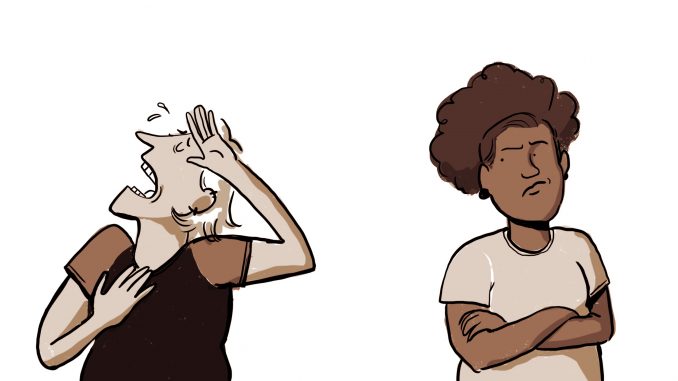
A Black friend recently suggested that I need not feel guilty about past racial atrocities. I understand why she might say this to me: liberal white people have an earned reputation for not just your garden variety of guilt, but white guilt. It seems to be a developmental phase most of us who are white go through and many of us stay in for much or all of our lives.
The white writer, Eula Biss, has noted that in German, the word for guilt is schuld which is the same word for debt. She encourages white people to move out of a sense of guilt to recognizing a state of debt. This resonates strongly for me. I’ve long been done with white guilt, having spent considerable spiritual, emotional, and personal energy moving out of that useless space. But debt? And accountability? And reckoning? These are relational concepts, informed by my understanding of our interdependence, which I embrace and feel called to engage.
If you are white, I encourage you to do the same: to take on the practice required to rid ourselves of guilt and move into relationships of accountability, because there is a life-affirming generativity that exists in that dynamic space and in this newest era of racial reckoning, offering opportunities to act through a lens or reparations.

As Unitarian Universalists, in addition to whatever may be happening locally, there is the UUA’s ongoing commitment to fund Black Lives of UU, including the commitment to make amends for how we removed funding from Black organizations in the late 1960s. The UUA Board committed to ensure funding, repaying what was $1 million in 1968 and in modern times (with inflation) was $5.3 million. The UUA Board paid that debit in full, a few months early, last year. While reparations are costly, leaving the unpaid debt is even costlier.
There is the opportunity to adopt the 8th principle (a topic on which I am preaching next week). And so much more.
In 2019, before the murder of George Floyd and the social unrest that followed, the Associated Press found that the vast majority of Black Americans — 74% — favored reparations, but less than a fifth of white Americans did. Which brings us back to the Saturday Night Live opening skit. Which brings Unitarian Universalism, with its predominantly white make up and its commitment to racial justice, to a yet another threshold, pondering where we came from and where we are going, pondering what new way we are building.
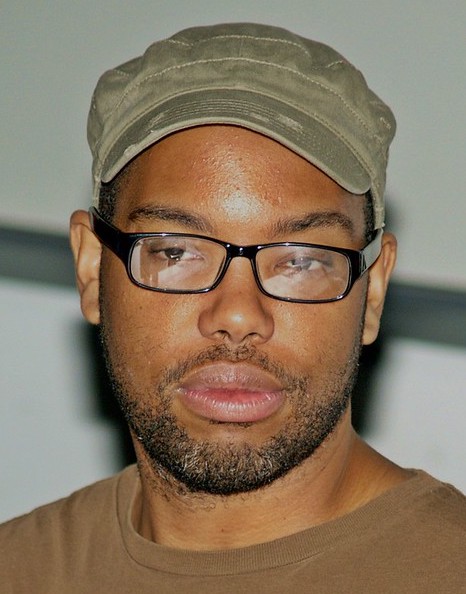
Ta-nehisi Coates has written that, “The problem of reparations has never been practicality. It has always been the awesome ghosts of history.”
Let us liberate ourselves from those awesome ghosts of history.
Let us be wiley enough as inspired by the clarity, courage, and candor of Jordan Anderson, still speaking to us from more than a century and a half ago.
Let us engage the practice of our first hymn: knowing where we come from in order to get a sense of where are we going.
Let us use this Memorial Day weekend to remember that the roots of Memorial Day come from enslaved people mourning civil war dead in Charleston, South Carolina in 1865.
Let us observe the 100th anniversary of the Tulsa Massacre, giving witness to the testimony of Ms. Viola Fletcher and her heart-breaking request that there be justice in her lifetime.
Let us do the necessary weeping before we rebuild the glorious Beloved Community.
Let us be brave enough to face our histories so that our futures are not contorted by the worst of the past, but buoyed by the best of our present efforts.
Let us exercise the best of our moral imaginations when it comes to the case for reparations.
Amen. May it be so.
